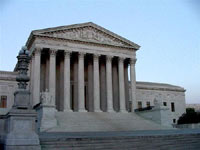|
|
|
Supreme Court to hear Global Warming case
Breaking Legal News |
2006/11/29 18:16
|
The US Supreme Court heard oral arguments Wednesday in Massachusetts v. EPA, 05-1120, a case where 12 states and several environmental groups are challenging an Environmental Protection Agency (EPA) determination that it does not have the authority under the Clean Air Act (CAA) to regulate the emission of "greenhouse gases," such as carbon dioxide, by automobiles.
The petitioners argued that the unfettered emission of greenhouse gases causes irrevocable damage to the environment through the erosion of coastal land. Questions remain, however, whether the petitioners have sufficiently satisfied the burden of proving that the EPA's failure to regulate caused any harm. Chief Justice John Roberts and Justice Samuel Alito appeared most reluctant to accept the petitioners' arguments, noting that EPA regulation of automobiles would have little impact on the overall emission of greenhouse gases.
Lawyers representing the EPA pointed to the substantial effect on the economy that regulation would cause. Additionally the federal government lawyers argued the Bush administration's position that the EPA would not restrict emissions even if it had the authority under the CAA because scientific evidence of the effect of greenhouse gases on global warming is too uncertain. Massachusetts v. EPA is the first case concerning global warming to come before the Supreme Court.
Neal Andrea
Staff Reporter |
|
|
|
|
|
|
Class action or a representative action is a form of lawsuit in which a large group of people collectively bring a claim to court and/or in which a class of defendants is being sued. This form of collective lawsuit originated in the United States and is still predominantly a U.S. phenomenon, at least the U.S. variant of it. In the United States federal courts, class actions are governed by Federal Rules of Civil Procedure Rule. Since 1938, many states have adopted rules similar to the FRCP. However, some states like California have civil procedure systems which deviate significantly from the federal rules; the California Codes provide for four separate types of class actions. As a result, there are two separate treatises devoted solely to the complex topic of California class actions. Some states, such as Virginia, do not provide for any class actions, while others, such as New York, limit the types of claims that may be brought as class actions. They can construct your law firm a brand new website and help you redesign your existing law firm site to secure your place in the internet. |
Law Firm Directory
|
|






